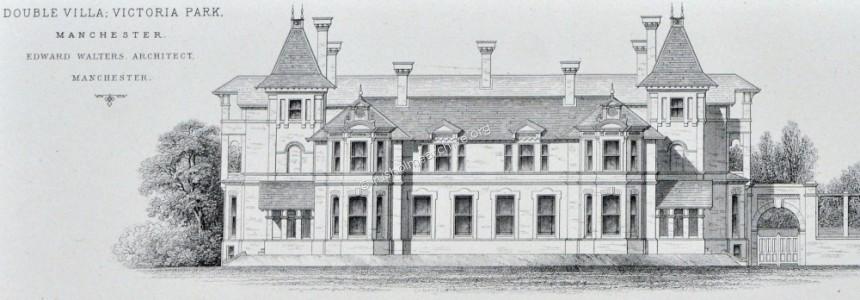Rusholme & Victoria Park Archive
An Apiary in Fallowfield?
Birch Fold Cottage, Old Hall Lane.
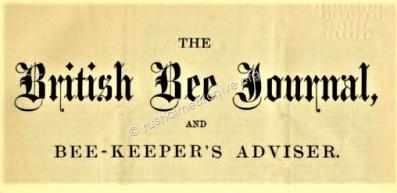
You may be surprised that Fallowfield should feature in a journal devoted to bee-keeping. A bee-keeper at Rainow in Cheshire, Peter Neville, sent me some archived material from the British Bee Journal published in August 1897. There was a regular column about the apiaries of Bee Journal readers and on that occasion it was the Secretary of the Lancashire and Cheshire Bee-Keepers Association. He was a Mr F H Taylor who lived at Birch Fold Cottage, (off of Old Hall Lane) which is the border of Rusholme and Fallowfield.
Birch Fold Cottage was reputed to be the oldest house in Rusholme, indeed William Royle in his History of Rusholme repeated the (myth?) that Oliver Cromwell had slept there. What clearly is on record is that Birch Fold Cottage was for many years the home of the Cottrell family, Thomas Lowe, who married two women in the Cottrell family, died there in 1892. The illustration below is from Thomas Royle’s History of Rusholme.
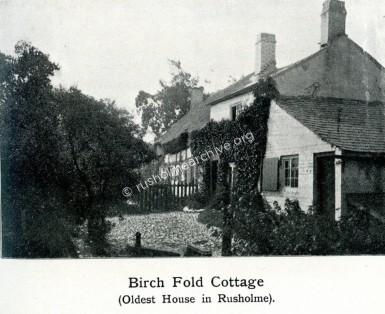
How long the widow of Thomas Lowe remained at the cottage is unclear, but by 1897 Mr Taylor was living at Birch Fold Cottage with a well-established Apiary. The journal opened its account;
“Few readers, knowing the reputation of Manchester for dirt and smoke, will believe that the picturesque cottage and garden we depict this week stands within three miles of the Exchange. Indeed, until quite recently people living a few minutes' walk were ignorant of it. But district secretarial work of the L and C. B K.A., and the numerous bee-meetings held at the "Cottage,’ have made it a household word with number of enthusiastic bee-keepers, who soon make themselves at home there. Mr. Taylor welcomes all and any who love the honey-bee and spring, summer, and autumn the place is the rendezvous of those wishing to learn of bees and of bee-keeping.
The watercolour painting below of Birch Fold Cottage belongs to Charlotte Broadbent, a great, great granddaughter of Thomas Lowe; It had belonged to her mother who described it as the family home. Charlotte has now very kindly offered rusholmearchive.org the opportunity of displaying the watercolour.
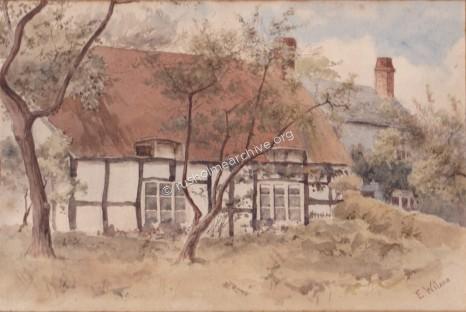
"Writing to us on the honey production of the district, Mr. Taylor says “One cannot expect great results so near a large city as Manchester, yet I make the bees pay well. In 1894, four hives gave me 995 lb. of honey and five swarms. The largest "take" from a single hive was 82lb. of honey and one swarm, which latter yielded 28 lb. of honey and a virgin swarm. Even in such poor seasons as 1895 and 1896 the average was over 20 lb. per hive". On undertaking the duties of local hon. secretary to the L. and C. B.K.A. three years ago Mr. Taylor began with three members. There are now sixty on his list. Birch Fold Cottage in spring has been compared to a very " Paradise," and though the encroaching hand of the builder is visible around, we hope its present occupier will for years be enabled to retain the quaint old place as a " Home for the Honey-bee."
The illustration below is a drawing by Sarah Corbett who drew a number of homes in the locality
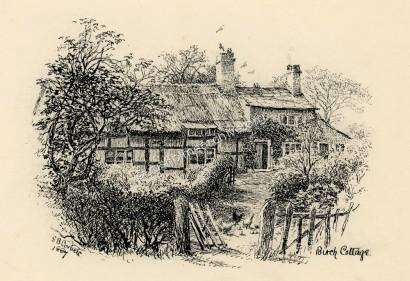
"The late Mr. Pettigrew of big skep fame kept his bees within a quarter of a mile from the apiary which is the subject of the present notice; but, as stated in his ‘Handy Book’ on bee keeping, he found it a poor neighbourhood for bees. “They can barely keep themselves in ordinary season'' he says. Seeing, then, that Mr. Pettigrew failed with his famous skeps, it says much for modern management when so much better results are obtained by the intelligent use of frame hives.
The apiary, (photo below), now numbers eighteen hives— sixteen frame hives and two skeps — scattered all over the garden, as seen in the photo. The hives are built on modern principles and the influence of this apiary extends far beyond its own district, which, of itself, is extensive, for we learn that its owner has correspondence with bee-keepers so far away as Palestine in the east, to Brazil in the west".
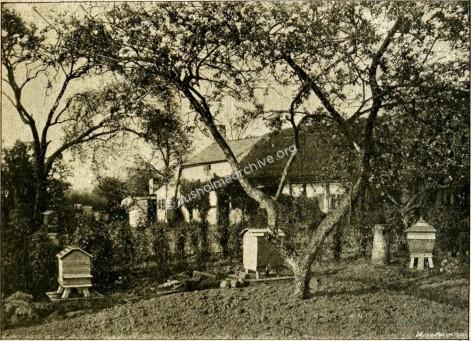
"Birch Fold Cottage stands in a large old- fashioned garden, nearly an acre in extent, and plentifully supplied with fruit trees of every kind and an abundance of flowers all through the year when blooming is possible. Crocus first appear, succeeded later with Limnanthes. Borage grown in great masses causes keen delight. Then in autumn there are giant balsams, grown by hundreds indeed, the place is sometimes called " Balsam Forest".
The photograph below is of the back garden of Birch Fold cottage and is presumed to be of Mr Taylor and bee-keeping friends.
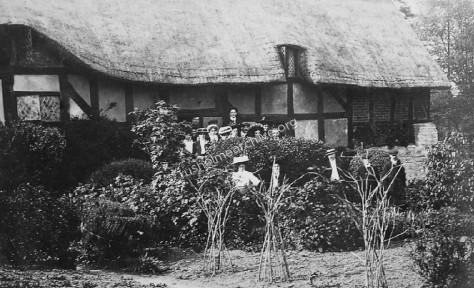
Now although that is the end of the article in the Bee-keepers journal I can well imagine that readers will presume that was the last of bee-keeping in this locality. However, during the 1970’s, I lived on Conyngham Road in Victoria Park and the adjoining property was No.2 Conygham Road, generally known as Mr Hadfields, (now Lane Court), photo below.
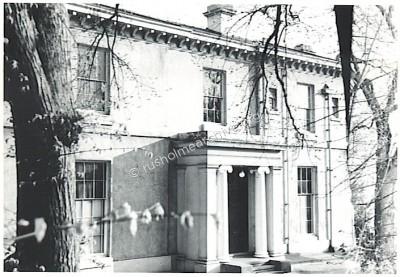
The house was used as offices for the Building Trades Federation and the caretaker lived in the old coach house. I cannot remember the name of the caretaker, but he kept bees and the hives were spread across the extensive garden of No. 2 Conyngham Rd. Again, I cannot remember the detail, but when the caretaker told me about the amount of honey he collected from his hives I really was surprised……………if there are aspiring bee-keepers in Rusholme or Fallowfield perhaps there is an opportunity to revive a past hobby.
You may have noticed an earlier reference to the ‘late Mr Pettigrew’ who had an apiary near to Birch Fold Cottage and therein lies another part of bee-keeping history that can be found in Rusholme.
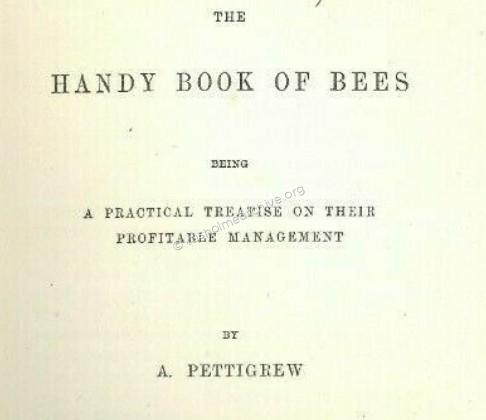
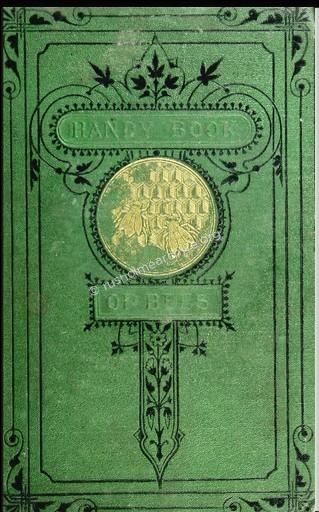
Alexander Pettigrew was born in Scotland in 1818, the son of a country labourer who became a publican, butcher and who was a leading beekeeper in Scotland.
Alexander started work as a gardener and moved to “Wrotham Park” near London to complete his gardening knowledge. He left London and settled in Manchester, the 1851 census records Alexander living at Green Hill Lodge, Cheetham & married to Elizabeth with an 11-month son, James. Alex gave his occupation as a gardener and ten years later the 1861 census records Alex with a similar occupation as nurseryman and florist. However, Alexander and Elizabeth are now living at Brighton Grove Nursery, Rusholme with their son William, (age 9 and a scholar). I cannot find any evidence of a garden nursery on local maps although there was a nursery on the adjacent Norman Rd. Another possible explanation is that Alexander may have been employed in one of the extensive gardens in the locality, (Appleby Lodge?)
During this period Alex must have been planning to write his book as it was first published in the spring of 1870 by Blackwood & Co., Edinburgh publishers. There was a fairly lengthy preface and I offer a lightly edited version.
‘Bread is the first consideration of man. After food and clothing are obtained, he may seek recreation, music, society, knowledge, or anything else lawful. So, in beekeeping we reckon the question of profit is of first importance. Stings do not seem half so painful to the man whose annual proceeds of bee-keeping amount to £10, or £20, or £50. But in addition to the profits of bees, there is a fund of interest and enjoyment derived from keeping them, uplifting in its nature and tendencies. One of the most pleasing sights on earth is that of a son of toil, after the labour of the day is done, taking a child in his hand, and going to see his pig, or cow, or beehive in his garden. Who has not seen hundreds of working men blessed and charmed beyond description in attending to their bees and cows? Such men are superior to the low vulgarities of the public-house, and superior in every sense to those who waste their time and strength in drinking. We hold that all employers of labour would do well to encourage their servants to spend their leisure hours in a profitable way. In country places and villages the gill of a few swarms of bees to deserving servants, and a practical treatise on their management, might become a source of perennial income and pleasure to them, and be, in fact, a greater boon and benefaction than a row of cottages. The author, who is a working man himself, humbly greets working men on the completion of this work, which has been written with an eye to their welfare, and with the hope that the “ finger-posts" herein set up will guide many of them along the high road to great success in bee-keeping.’
RUSHOLME, MANCHESTER, March 1st, 1870.
There were a number of reviews and 5 are below.
“The author of this volume is evidently a practical man and knows a great deal more about bees and their habits than most of the bee-keepers in England: indeed be may be said to be a very master in the art of bee mysteries.” Bell's Life in London.
“This volume is throughout so obviously the result of observation and ripe experience as to leave no doubt of its value as a manual for the apiarist” Bristol Mercury.
" How to manage bees properly, so as to make a profit, is so clearly and pleasantly told in this capital work, that we need not trespass on its pages longer." Sherborne Journal.
“We recommend his book to all who wish to spread a knowledge of this useful art among their neighbours and friends.” Land and Water
‘The rearing of bees having become no less a source of mania to the breeder than a matter of pastime, any trustworthy treatise relating to their breeding and management must necessarily prove acceptable. We say, " trustworthy treatises," because many having that appellation have been issued, but we fancy more for speculative purposes than for any useful instruction they may contain. The one before us, however, differs in all respects from many of its predecessors in this one particular feature: that it emanates from the pen of a practical man”. Newcastle Courant.
Regarding all of the information about him being a successful bee-keeper in Rusholme I think that in some respects Alexander was perhaps, a little economical with the truth. I found in another agricultural journal the following letter,
‘My garden is on the immediate south of the black, but no mean city of Manchester. Our position is too near the city for honey gathering. Hence, we send most of our hives of bees four or five miles into the country, where they are placed in cottage and market gardens during the spring and summer months. Any out-of-the-way or rubbishy corner of such garden’s answers well as a stand or home for bees. We gladly pay rent for a small space in such places; and our items of expense for rent and carriage are always heavy and astonish those whose bees are never removed from their own gardens’. My income from bee-farming this year is £95; expenses £28, profit £67. My object in presenting annually a balance-sheet of bee-culture to quicken the attention of the rural population of England to the value of bees. The price of butter is so high that labouring men cannot buy it for their families. Honey is an excellent substitute, quite as healthy, and better liked by children.”
Alex Pettigrew must have left Rusholme circa 1872, moving to Altrincham, Cheshire, as the preface to subsequent editions were from the Priory Vineyard, Sale. I think the vineyard was adjoining ‘The Priory’, a substantial house that belonged to the descendants of Dr Charles White, the founder of Manchester Royal Infirmary.
The second edition of the book was being listed in 1875 as cheaper at only three shilling and sixpence, (17.5p).

In the British Bee Journal reference was made about Mr Pettigrew’s ‘Big Skep’. The skep was the traditional straw hive that had been used for centuries and Alex Pettigrew was firmly committed to this style rather than the more recent wooden hive that can be seen in the garden of Birch Fold cottage. However, after the second and third editions of the book were published Alex Pettigrew gave ground and in the fourth edition, published in 1880, there was a supplement. Alex explained in the preface:
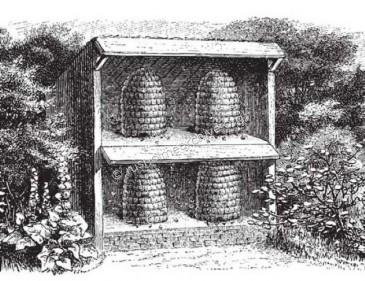
‘As there are other schools of apiarians, a Supplement has been added to this edition. In this Supplement a description of the best system of managing the bar-frame hive and the Stewarton hive has been given. The reader of this work will thereby have an opportunity of gaining a comprehensive knowledge of the best systems of bee-management practised in Great Britain.
In 1850 when presumably living at Cheetham Hill, Alexander Pettigrew became embroiled in a notable libel case. Alexander was a member of the congregation at the Cheetham Hill Congregational Ducie Chapel. Reading various reports in the press the case revolved Alexander becoming aware of ‘improper conduct’ on the part of the minister (in the Vestry(!)). Apparently, Alexander told other members of the congregation and the following brief extract gives some idea of the trial.
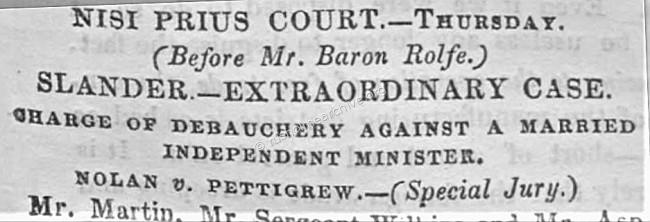
Morning Chronicle, Monday 01 April 1850.
The action was brought by Edward Henry Nolan (called Doctor Nolan), a dissenting minister, against the defendant a Mr. Pettigrew, complaining of a slander uttered by him.
Dr. Nolan complained of the slander as being a scandalous reflection on his character, by charging him with having committed adultery and fornication, and with having endeavoured to cloak it from the eyes of the world by giving a prescription to one of his victims to procure abortion. The answer of Pettigrew was first that he did not say it , and secondly, that he was justified in saying what he did because it was true that Dr. Nolan did commit fornication and adultery with two females named Elizabeth Townley and Mary Gilchrist.
Fortunately for Alexander the minister, Dr. Nolan, did not win his case…
Alexander Pettigrew died in March 1884. He was only 66 and buried in Sale cemetery being interred with his son William who had pre-deceased his father by 6 years. In spite of only being a ’working-man’ his bee-keeping and careful book-keeping ensured he was comparatively well-to-do, and he died leaving over £1000.00 pounds. Probate notice can be seen below.

The sum of £1,327 -10-3d was a tidy sum and must have represented many skeps of honey! Using the website, ‘Measuring Wealth’ the comparative figures can be seen in the chart below.

As a souvenir of this story, you might like to download and read a copy of Alexander Pettigrew’s ‘Handy Book of Bees’. Cornell University has made a copy available to the Internet Archive, as it is in the Public Domain it can be downloaded in different formats, PDF, Kindle etc. Click here
The image of the bee has been part of Manchester for nearly two centuries, Manchester first started using the worker bee as a symbol during the Industrial Revolution. ... The worker bee symbolised the hard work of every Mancunian, making the city a 'hive of activity' in the 19th century. The worker bee officially became part of the Manchester coat of arms in 1842.
Image below of a bee in the Manchester Northern Quarter courtesy of Duncan Hall.
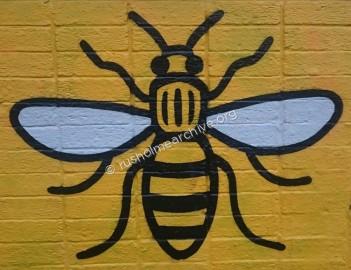
In preparing this page about bees in Fallowfield and Rusholme I should like to thank Peter Neville who alerted me to the Bee-Keeping journal and Mr Alan N. Morrison, Chairman of the Sale and Ashton History Society who provided me with useful information about the Priory vineyard and who also drew my attention to the libel court case.
